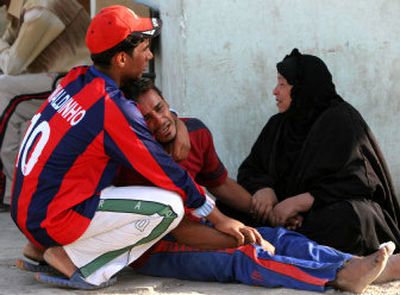Al-Sadr loyalists kill 4 Shiite police officers

BAGHDAD, Iraq – Militiamen loyal to an anti-American cleric re-emerged Monday in the southern city of Amarah, hunting down and killing four police officers from a rival militia in a brutal Shiite-on-Shiite settling of scores.
The Iraqi army set up a few roadblocks but did not interfere in the movement of Muqtada al-Sadr’s Mahdi Army fighters after police fled the streets. The latest attacks came despite a public call by al-Sadr to halt the tribal vendetta, suggesting that splinter groups were developing within his militia.
The spread of revenge killings among Shiites in their southern heartland has opened a new and ominous front as American forces struggle to control insurgent and sectarian bloodshed to the north – especially in Baghdad.
In the capital, the U.S. military reported that a soldier was listed as missing Monday night and that American and Iraqi forces were scouring the area where he was last seen. The missing soldier is an Army translator, and the initial report is that he may have been abducted, said a military official in Washington.
With the fighting weighing heavily on the prospects of Republican candidates in midterm elections two weeks away, the military on Monday announced four new U.S. deaths – a Marine and three soldiers. So far this month, 87 American service members have been killed in Iraq.
Prime Minister Nouri al-Maliki announced a military crackdown to tame the country’s staggering armed violence, taking special aim at continuing lawlessness in Amarah.
But his statement, while notable for its timing, appeared toothless, especially given that his army was standing aside in Amarah and has fallen short of delivering troops requested by the Americans for the ongoing security crackdown in Baghdad.
“The Iraqi government hereby warns all groups with illegal weapons to refrain from any armed activities that undermines public security. Let everyone be informed that orders have been issued to the armed forces to stop any transgression against state power and to confront any illegal attempt regardless of its source,” al-Maliki wrote in his decree.
Hoping to find a political solution, the Bush administration has asked al-Maliki’s government to issue an unconditional amnesty to Sunni Muslim insurgents, prominent Kurdish lawmaker Mahmoud Othman said. He is a confidant of Jalal Talabani, the country’s president.
He and Hassan al-Seneid, a member of parliament close to al-Maliki, also said that U.S. officials were engaged in ongoing talks with members of the insurgency, including members of Saddam Hussein’s outlawed Baath Party, to seek an end to the fighting that has plagued American forces in Baghdad, surrounding areas and sprawling Anbar province to the west.